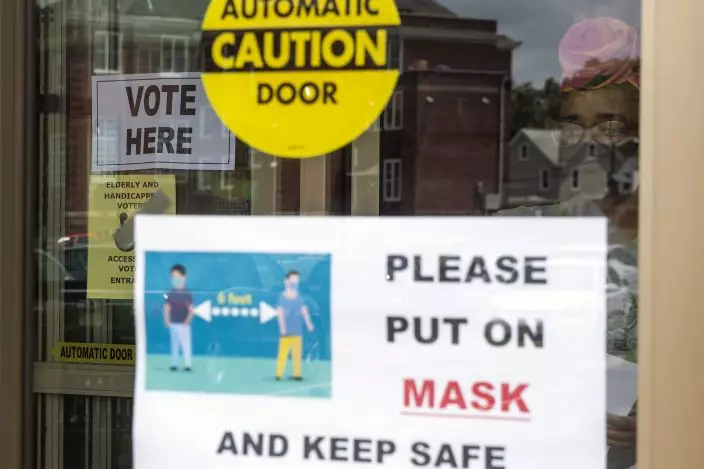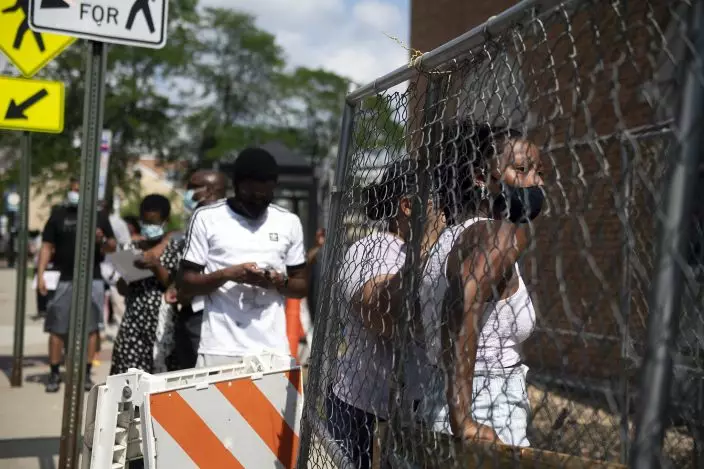New Jersey will move to a nearly all-mail election this November, following the model the state used in its July primary, Democratic Gov. Phil Murphy said Friday.
Murphy, a Democrat, said during an interview with CNN that all voters would get a ballot, but it's not clear if people who aren't registered will get an application to register.
“It doesn't matter what party you're in, everybody gets a ballot,” Murphy said.

A person peeks out of the glass door of a polling location for the state's primary election at Town Hall in Moorestown, N.J., Tuesday, July 7, 2020. New Jersey Democrats and Republicans are choosing their candidates for president, Senate and House, but because of the COVID-19 outbreak they’re doing it mostly by mail-in ballots. (Joe LambertiCamden Courier-Post via AP)
Murphy is expected to address the change during a news conference later Friday. The nearly all-mail election in July stemmed from the coronavirus outbreak.
The development comes just a day after Republican President Donald Trump acknowledged that he’s starving the United States Postal Service of cash to make it harder to process millions of mailed-in ballots.
Saying that the general election will mirror the July primary, Murphy indicated that the only in-person voting will be with provisional ballots. That means if voters want to cast their ballot in person, they'll have to go to one of a reduced number of polling places and cast a ballot that will be counted only after officials determine the voter didn't mail in a ballot.

Voters wait in line to drop off ballots in the state's primary election at the Burlington County Board of Elections Tuesday, July 7, 2020, in Mount Holly, N.J. New Jersey Democrats and Republicans are choosing their candidates for president, Senate and House, but because of the COVID-19 outbreak they’re doing it mostly by mail-in ballots. (Joe LambertiCamden Courier-Post via AP)
In July, each county had to keep at least 50% of its polling places open for in-person provisional voting.
If the July 7 primary model is used, voters will be able to mail back their ballots to county boards of elections, deliver them there in person or use drop boxes that are scattered across the county. Most counties had at least five drop boxes in July.
The state Republican Party petitioned the U.S. attorney in New Jersey to install election monitors over concerns of “disenfranchisement."
Some Democrats have also voiced concerns. Paterson Mayor Andre Sayegh has said he wants there to be traditional in-person voting, saying that he was a “purist” and there was a sense of accomplishment after voting in person.
Paterson is at the center of criminal election fraud charges brought by Attorney General Gurbir Grewal. The charges stem from the May municipal primary there. Grewal charged a Paterson city councilman, a councilman-elect and two other men with voting fraud.
He cast the charges as a warning ahead of last month's first-ever nearly all-mail election statewide.
Grewal's investigation began when the U.S. Postal Service’s law enforcement arm told the attorney general’s office about hundreds of mail-in ballots located in a mailbox in Paterson, along with more found in nearby Haledon.
Three of the four defendants' attorneys said last month that their clients disputed the charges.
New Jersey previously had no-excuse mail-in voting.
Five states — Colorado, Hawaii, Oregon, Washington and Utah — relied on mail-in ballots even before the coronavirus pandemic raised concerns about voting in person this coming November.


